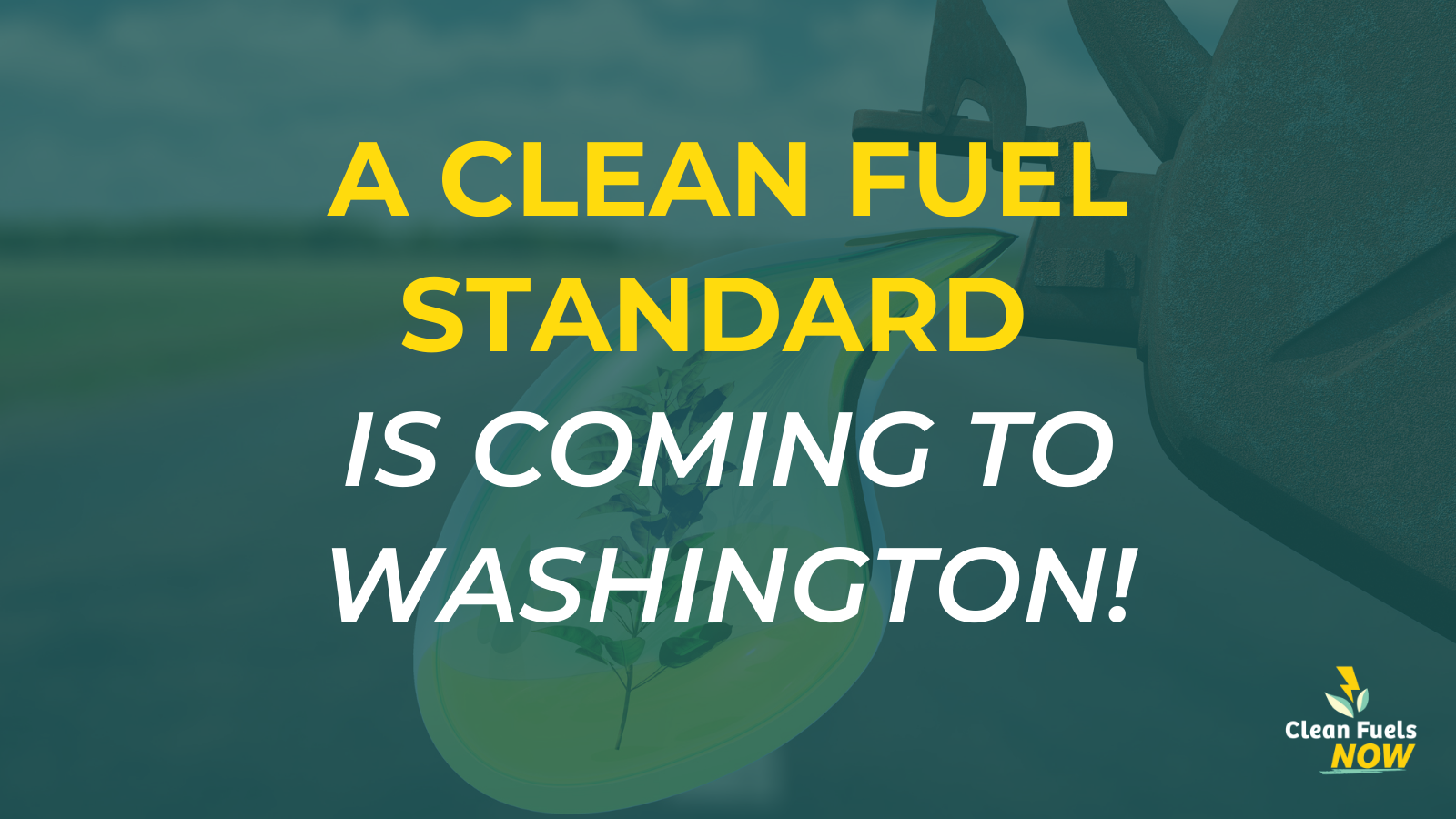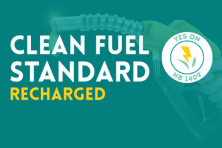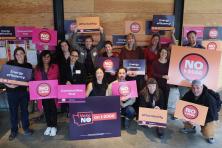Olympia, WA—Yesterday, the Washington State Department of Ecology released the final rule for the Clean Fuel Standard (CFS), confirming details for the program that will launch on January 1, 2023. The Washington State legislature passed the Clean Fuel Standard into law in 2021, joining California, Oregon, and British Columbia to create a Clean Fuels West Coast.
The CFS requires transportation fuel producers to reduce the carbon intensity of their fuels (e.g. gasoline and diesel) or to invest in the production of cleaner fuels, such as electricity and low-carbon fuels. With the transportation sector in Washington still responsible for the largest share of climate pollution in the state—nearly 45% of our total greenhouse gas emissions and greater than the total emissions of entire countries, including Norway, Ireland, and New Zealand—the CFS is a critical program for reducing these emissions while supporting the market for clean transportation fuels. The final rule requires a 20% reduction in the carbon intensity of transportation fuels by 2034—the strongest possible trajectory under the law. This trajectory best aligns with Washington’s statutory greenhouse gas limits, other state programs, and an imperative to reduce air pollution and support local, clean energy jobs.
CFS benefits have been felt along the West Coast states. Oregon’s program resulted in over $103 million for clean fuel producers in 2020. In September 2022, Oregon elected to expand their program to the strongest in the nation, requiring a reduction in carbon intensity of 20% below 2015 levels by 2030 and 37% below 2015 levels by 2035.
How the CFS program works
A CFS requires fuel producers to sell a cleaner product or invest in clean, low-carbon choices such as electricity and sustainable biofuels to power transportation. Carbon intensity is determined over a fuel’s whole lifecycle, including distribution and production, meaning clean fuels considered under the standard will lead to holistic greenhouse gas emissions reductions.
Producers of high-carbon fuels (e.g. oil companies) have a few choices for how to comply. They can clean their fuels by improving their own processes and reducing emissions or they can pay for clean fuels production by purchasing credits from clean fuels producers. This will create a positive investment cycle: clean fuels producers and green fleet operators will be able to expand clean fuels use and production while producers of high-carbon fuels pay for that expansion.
Clean fuel producers—including electric utilities, electric vehicle charging providers, and sustainable biofuels producers—will generate revenue through the sales of clean fuels credits, making clean fuels more cost-effective for the Washington consumer. Per the rule, utilities must reinvest this revenue in furthering transportation electrification in their territories, with at least 30% of these investments directly benefiting communities that are most impacted by pollution. Fleet operators that use clean fuels such as electricity or sustainable biofuels will also produce credits, the revenue from which they can reinvest in cleaning their own operations.
CFS benefits extend beyond climate
The CFS will work in concert with other Washington climate and clean transportation policies, such as the Climate Commitment Act and the Advanced Clean Cars and Trucks rules, to achieve the state’s statutory greenhouse gas emissions limits. By 2034, the CFS will reduce Washington’s greenhouse gas emissions by 4 million metric tons annually and create a positive reinvestment cycle for the clean fuels economy.
The program’s benefits extend beyond climate. The Puget Sound Clean Air Agency has found that air pollution causes over 1,000 deaths each year in Washington, and increased wildfire smoke compounds air pollution. The CFS has the potential to significantly improve air quality and help transition to a cleaner, more just transportation system. Economic benefits will also come from local spending and jobs. Greater access to clean fuels in Washington will support rural economic development by using local fuels rather than relying on out of state oil, while simultaneously growing the clean energy job market. Right now, Washingtonians send $9 billion out of state every year through gasoline purchases. Washington already supports over 1,700 jobs in the clean fuels industry and almost 4,000 jobs in the electric vehicle industry, and the number of clean energy jobs has been growing.
The perceived impact to gas prices
The price of gas and diesel is driven by the global trading price of crude oil and oil industry profits. According to the Oil Pricing Information Service, profit margins in Washington are consistently among the highest in the nation, reaching almost 83 cents per gallon of gas this summer, 26% higher than profits were at the beginning of 2020. Ultimately, the oil industry charges the highest price that it can to bring in the largest profits.
Despite persistent opposition claims that the CFS and other climate policies increase the price of fuel, in both Oregon and California, clean fuels credit prices have not correlated with the price of gasoline and diesel. Notably, like Washington, Oregon and California have also enacted other significant climate policies in recent years. With a continued transition to clean fuels (including electricity), Washington’s reliance on oil will decline and individual transportation costs will decrease, freeing Washington consumers from the burden of volatile, often high, gas and diesel prices.
History of broad and diverse support for CFS
The Washington State legislature passed HB 1091 (CFS) into law in 2021 after a multi-year campaign. At the time of the bill’s passage, polling suggested that about two-thirds of Washingtonians supported such a policy. A broad coalition of supporters advocated for the law’s passage, ranging from environmental groups to businesses to health organizations and small restaurants. Many of these supporters have remained engaged during the rulemaking process, advocating for as strong of a program as possible under the law, with a carbon intensity reduction trajectory of 20% by 2034. During the public comment period for the rule, this trajectory was supported by more than 60 environmental, community, and health organizations, local governments and elected officials, and businesses.
“It is incredibly exciting to see the Clean Fuels program, the result of years of hard work by an amazing coalition of supporters, come into effect,” said Leah Missik, Washington Transportation Policy Manager at Climate Solutions and Campaign Manager for the Clean Fuels Now coalition. “Washington will join other states on the West Coast in benefiting from clean fuels options, cleaner air, and freeing ourselves from bearing the burden of high gas prices and record-high oil industry and oil cartel profits.”
“Busy roads and transportation hubs expose over four million people in our state to harmful diesel fumes, and Black people, Indigenous people, People of Color, and low-income people are disproportionately burdened by polluted air,” said Caitlin Krenn, Climate & Clean Energy Campaign Manager at WA Environmental Council. “The Clean Fuel Standard will advance our state’s climate goals and ensure investments are prioritized to Tribal Nations and communities impacted by pollution. This law is the result of years of hard work by everyday Washingtonians, public health advocates, environmental champions, and our elected leaders. We’re excited for the Clean Fuels Program to begin in January, as the state legislature considers more historic investments to equitably reduce climate pollution and improve health and resilience in communities across Washington.”
"The Clean Fuel Standard will unite Washington with the rest of the West Coast towards a clean transportation future," said Annabel Drayton, Policy Associate with the NW Energy Coalition. "The strong standard will work hand-in-hand with policies such as the Clean Vehicles Program and soon to be adopted consumer protection standards for public EV charging to improve air quality and increase access to electricity as an affordable transportation fuel."




